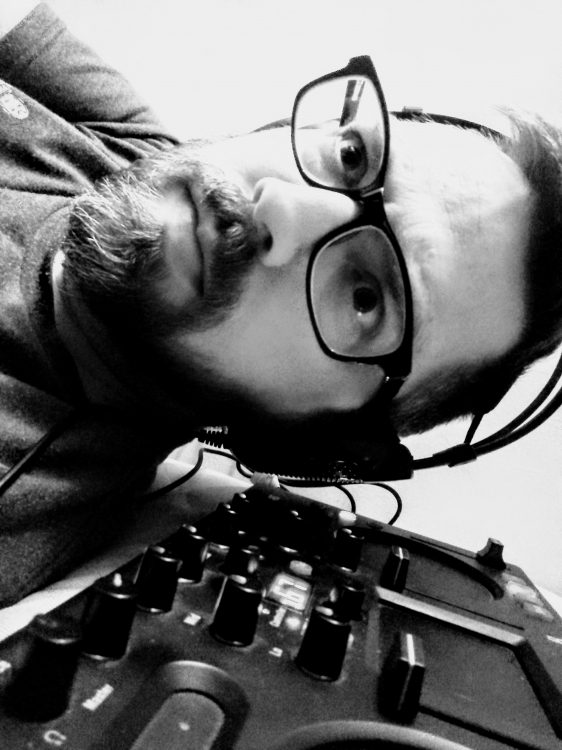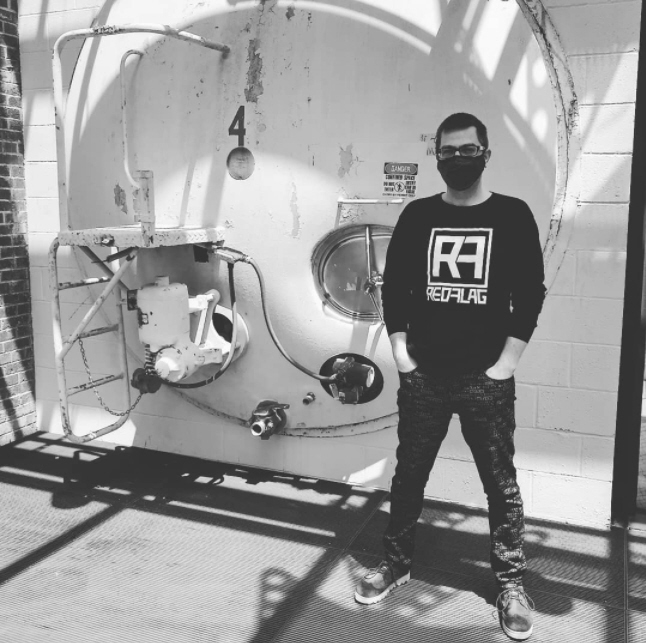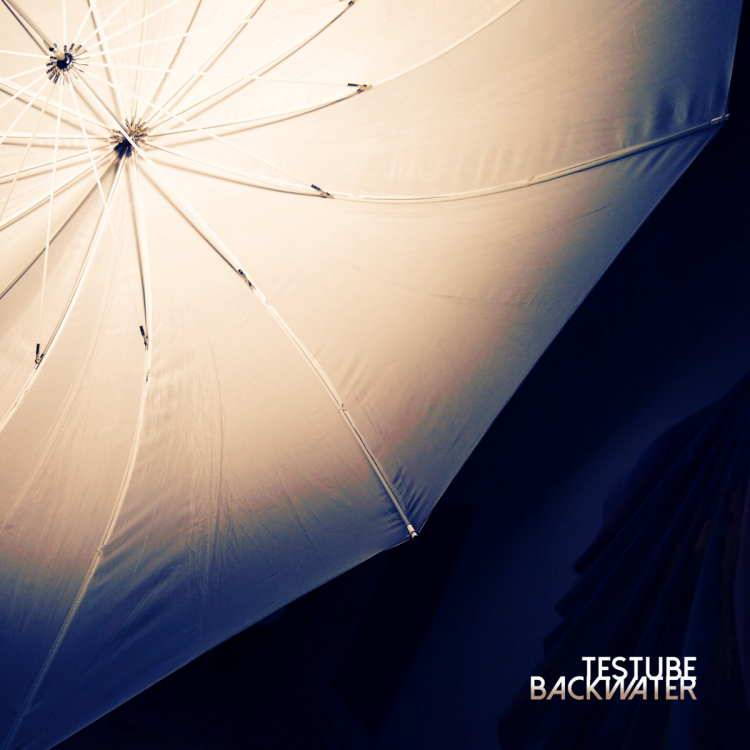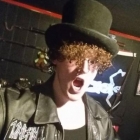Hello Testube and welcome to Brutal Resonance! I love opening with this question so I’m going to ask it. What are three of your favorite albums of all time and why?
Jeff Danos: That’s a very difficult question, as I enjoy so many different kinds of music that it truly depends on what kind of a mood I am in, and whether I want to feel nostalgic or hear something newer. However, if I think of three albums that I have never grown tired of hearing over the years, and which I consider part of the soundtrack to my life, I could say Bowie’s “The Rise and Fall of Ziggy Stardust and the Spiders from Mars”, Tear Garden’s “Crystal Mass” and The Cure’s “Three Imaginary Boys”.
Now, take me back to the origins of Testube. You started twenty years ago. What band or bands got you into industrial music, and what made you start making it?
Jeff Danos: I started making music/noises as a teen around 1994. I started out by playing around with my father’s dual cassette deck and discovered that if I pushed down the pause button only halfway, it would erratically play the tape at twice the speed, and if I recorded onto it while it was acting up, it slowed down the recording. I tried doing that cumulatively five or six times in a row and got some weird drone recordings. I felt like I was in Zoviet France or something!
One of the very first bands I was part of was called Wrack Process, which I formed with my good friend Bryan Elsloo (In Virus Tandem). We were inspired to create our own music after hearing bands like Skinny Puppy, Front 242, Severed Heads, Coil, Cabaret Voltaire, Depeche Mode, and Fad Gadget. We were also involved in the fledgling goth-industrial scene of Denver that was forming in the early to mid 90s and were heavily influenced by our peers and friends in the local bands Mindpeg, Society Burning, Fiction 8, White Trash Compactor, Separate Faith, Filmstrip, and Velvet Acid Christ. In fact, we played our very first demo tape for Brian and Gary from VAC in my car one evening and they were nice enough to give us our first words of encouragement, despite the horrible recording quality! With Wrack Process, our equipment was very basic, and we would never rehearse but just record hours of live improvisational jam sessions in whatever warehouse Bryan was living in at the time. Then we would edit the recordings and call it an album! We made a lot of Wrack Process albums.
And where does the name Testube stem from? Does it have a personal or more in-depth meaning, or is it simply a name?
Jeff Danos: Testube started out as a side-project for the band Wrack Process. Initially, I think we wanted to give it an electronic tribal feel. I don’t recall how I thought of the name originally, but I think I was attracted to the concept of musical experiments grown in a lab. It was intentionally misspelled, which I have come to regret a bit over the years, but too late now! Bryan and I did a couple live recording sessions for the project and eventually compiled the first Testube cassette in 1996. Later, as he and I were moving in different musical directions, Bryan started recording under the name In Virus Tandem, and I opted to produce my solo work as Testube after testing out a few other random monikers.
In the late nineties you became relatively popular with mid-tempo EBM albums and the like. Take me on a journey in time. What labels did you sign with, how did you meet them, and what was your initial reaction to this breakout?
Jeff Danos: My first three Testube releases, and those by Wrack Process and a handful of other Denver acts, were released on my own label called the United Endangered Front (UEF Records). UEF also produced several “Pay for Play” CD compilations back in the late 90s, which was a popular way for underground bands who were only releasing cassettes to come together and split the cost of a professionally produced CD sampler. It probably sounds cheesy today, but each band would kick in like $100 for the manufacturing, and then get 50 to 100 copies of the disc when it came out, to sell or give away as they pleased. Most of the CD manufacturers back then required a minimum pressing of 1,000 discs, which was more than most of us would sell individually anyways.
By 1999, I was losing too much money on the UEF label, and I felt like I never had time for my own music. So, I shut the label down and released the Testube “Bioplaza” album without a label. I also started cranking out remixes for other acts around that time. Thanks to my album which was well received, and a remix that I did for Leatherstrip’s “Carry Me” in 2000, Testube attracted the attention of a few independents, and I ended up signing to DSBP. I already knew the label head Tommy T, since he had started DSBP around the same time I was running UEF Records, and I used to send him promos to play on a college radio station he deejayed at in New Mexico.
Now in the early to mid-2000s, I read that a lot of your former support (DJs, zines, etc.) fell away and left your album “Corporation” in relative obscurity. What led to Testube somewhat drifting into a few years’ silence?
Jeff Danos: “Corporation” was a challenging album for me. I was moving away from hardware sequencing and using a computer DAW for the first time, and for whatever reason Fruity Loops felt like the easiest transition from an Alesis MMT-8 sequencer to a computer interface – probably because FL was all button-based. Trying to finish those songs in FL turned out to be a nightmare, though, and I moved away from that software after that release, but I think it heavily influenced the sound. That album played off of a lot of the glitch and IDM-flavored industrial music of that era, projects like Lassigue Bendthaus and what Haujobb and Forma Tadre were doing. But I was also told that I had ventured a bit too far into Aphex Twin and Squarepusher territory. I think it freaked out a lot of the folks who enjoyed the standard EBM stuff I had done before that. At the time, it didn’t really register with me that I could be releasing something that was “too weird” since I’ve always considered industrial music to be something that is supposed to push the boundaries, and not repeat itself.
Nonetheless, you came back in 2008 with the EP “Covert” and the album “Off Purpose”. Though you garnered critical success, did it prove as popular as your earlier releases or did you struggle to get back into rotation?
Jeff Danos: Those were released under another label called Glim Records, one that I had co-created with another former Denver musician, Jonathan Chalker of the bands Mindpeg and LowHero.DLL. I didn’t really promote those releases as much as I should have. I think I felt like the goth/industrial scene wouldn’t want to hear what I was doing after being gobsmacked by the “gooey casio cheese” (their words) of my “Corporation” album, even if my newer material was straying back towards my industrial roots again. Some of it was more “experimental pop” than anything, so it probably would have been more accessible if I had pushed it a little harder. But I just wanted to make music.
In 2012 you built a small cabin in the woods and went off grid with your wife. This, as many would probably know, proved improbably for making electronic music. Tell us about how you managed to create music still with no power, and the struggles that lied within.
Jeff Danos: Our new off-grid home was small, less than 500 square feet, so all of my musical equipment went into storage. Most of it is still there, waiting to be dusted off and fired back up. Living off-grid was a lot of work, so the first thing that impeded my musical progress was a lack of free time. Not having electricity meant using battery-powered devices. For music, I just used my laptop and a USB-powered MIDI keyboard controller with Ableton and a slew of VST plugins. No power for studio monitors, so mixing was done on headphones. We would regularly drive into town to visit the library and charge up my laptop. That would give me roughly two hours of music production time when we returned home. Anyone who is a creative producer of art knows that it is very difficult to create on such a rigid, restricted timeline. There were times when the battery would die in the middle of working “in the zone”, and I would want to tear my hair out. While building the cabin, we would occasionally run a small generator for power tools, and I made the mistake of desperately plugging my laptop into it one evening, frying the on-board power module. Hot tip: Don’t plug your computer into a generator unless it features pure sine wave power!
There’s a certain romantic notion about the idea of living simply and off-grid, but for someone who requires so much computer time for both work and play, it was very frustrating. I was often tempted to just give up on music altogether, but ultimately couldn’t. Even if nobody ends up hearing it, I still feel that I have to create.
Eventually you got fed up and brought power to the cabin, and now have “Backwater” at the ready. The recording of the album spans from the times living without power to the current. I imagine this makes for a very diverse album. What can we expect to hear on “Backwater”?
Jeff Danos: Being off grid also meant being isolated and somewhat out-of-touch with what was happening elsewhere. So, I probably missed many of the influences and styles that were trending. Musically, the styles on this one run the gamut from old school tinged EBM and industrial to experimental noise and glitchy ambient tracks, moody emotional anthems and dark pop.
Though the album is diverse, would you say there’s a unifying theme, or at least several motifs, connecting the album together? Or is it just as experimental in thought as it is in music?
Jeff Danos: Since it spans so many years (some of the songs took ten years to complete), I was worried that it might be too diverse of an album. But when I listen to it now, I feel like it tells the story of my life over the last decade. I don’t know if the listener will feel that, but most of the songs reflect what I was experiencing at the time. It’s actually a very personal album. The title track “Backwater” has several definitions, and they all seem to work – something that has been isolated and peaceful, but also stagnant, lacking progress or development. While I wouldn’t suggest that my music hasn’t progressed at all, there was definitely a feeling of being stuck in a situation that I couldn’t seem to break out of, even if I had placed myself there in the first place.
Other songs on the album touched on our move to the Ozarks (“Arkanstayed”), some inconsiderate neighbors that made our off-grid life more difficult (“Backyard Burner”), the election cycle (“God Blast America”), our daughter’s challenges in coming out as a teen (“Themself”), feelings of trying to overcome helplessness and regret (“Cost is Clear”), time spent working in a historic haunted hotel while it was shuttered during the pandemic (“Adventures in Heart-Stopping”), and of course the overall shitshow that was 2020 (“Memory Dump”).
And what else can we expect from you throughout 2022? Any other releases, so on and so forth?
Jeff Danos: Yes, I just finished a new track for the second “Genome” series assembled by Point Source Electronic Arts, and I am currently working on a remix of the amazing industrial act R010R. Now that our home is fully “electrified”, I feel very inspired to work on new music, so I’m going to focus on releasing singles more often. Hopefully Testube will stay on the radar this time!
Lastly, I’d like to thank you for your time. I wish you the best of luck with “Backwater”. I leave the space below for you to discuss anything I may have failed to mention.
Jeff Danos: Thank you again! Nothing more to add. Cheers!








